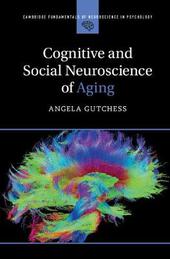
|
Cognitive and Social Neuroscience of Aging
Hardback
Main Details
| Title |
Cognitive and Social Neuroscience of Aging
|
| Authors and Contributors |
By (author) Angela Gutchess
|
| Series | Cambridge Fundamentals of Neuroscience in Psychology |
|---|
| Physical Properties |
| Format:Hardback | | Pages:298 | | Dimensions(mm): Height 235,Width 156 |
|
| ISBN/Barcode |
9781107084643
|
| Classifications | Dewey:612.82 |
|---|
| Audience | | Tertiary Education (US: College) | | Professional & Vocational | |
|---|
| Illustrations |
16 Plates, color; 61 Halftones, black and white
|
|
Publishing Details |
| Publisher |
Cambridge University Press
|
| Imprint |
Cambridge University Press
|
| Publication Date |
3 January 2019 |
| Publication Country |
United Kingdom
|
Description
Cognitive and Social Neuroscience of Aging is an introduction to how aging affects the brain, intended for audiences with some knowledge of psychology, aging, or neuroscience. The book includes figures illustrating brain regions so that extensive familiarity with neuroanatomy is not a pre-requisite. The depth of coverage also makes this book appropriate for those with considerable knowledge about aging. This book adopts an integrative perspective, including topics such as memory, cognition, cognitive training, emotion, and social processes. Topics include consideration of individual differences and the impact of disorders (e.g. Alzheimer's disease) on brain function with age. Although many declines occur with age, cognitive neuroscience research reveals plasticity and adaptation in the brain as a function of normal aging. This book is written with this perspective in mind, emphasizing the ways in which neuroscience methods have enriched and changed thinking about aging.
Author Biography
Angela Gutchess is an Associate Professor of Psychology at Brandeis University, Massachusetts, with appointments in Neuroscience and the Volen Center for Complex Systems. She received her Ph.D. in Psychology from the University of Michigan and her B.A./B.S. from Boston University. Her research investigates the influence of age and culture on memory and social cognition, using behavioral, neuroimaging (fMRI), electrophysiological (ERP), and patient (aMCI) methods. She has authored over sixty peer-reviewed papers on these topics. Her research has been funded by National Institute on Aging (NIA), National Science Foundation (NSF), American Federation for Aging Research (AFAR), and the Alzheimer's Association. As a Fulbright Scholar, she had the opportunity to spend a research semester in Istanbul at Bogazici University. Dr Gutchess was elected to the Memory Disorders Research Society. She currently serves as an Associate Editor for the journals Memory and Memory & Cognition, is an incoming Associate Editor at the Journal of Gerontology: Psychological Sciences, and serves as a Consulting Editor for Psychology and Aging and Culture and Brain.
Reviews'This is, to my knowledge, the first student-focused distillation of the complex literature on cognitive and social neuroscience of aging. Unlike the typical multi-author book targeting professionals and graduate students, this textbook is truly focused on the needs of undergraduate students and the lay audience. In addition to clear and engaging descriptions of fundamental theories and data, the book provides basic summaries of relevant neuroscience and methodology topics, making it approachable by readers without a background on these domains. For this reason, this is also an ideal book for professional from related fields, who are curious about the exciting new discipline of cognitive and social neuroscience of aging.' Roberto Cabeza, Duke University, North Carolina 'Dr Gutchess describes mechanisms of social, affective, and cognitive change with clarity, defining key terms and explicating research methods. This is an accessible introduction for those new to the field and, with its breadth of coverage and integration of recent advances, a valuable reference for those working in the field.' Elizabeth Kensinger, Boston College, Massachusetts 'Gutchess masters the textbook challenge of balancing breadth and depth in this accessible, comprehensive, yet succinct, new volume. The reader is immersed in the excitement of human neuroscience approaches to aging that combine behavioral experiments and neural measures to understand what happens in the aging mind and brain. The text will delight instructors to teach and students to learn about the neuroscience of aging, and will be a tremendous asset to the field.' Patricia A. Reuter-Lorenz, University of Michigan
|